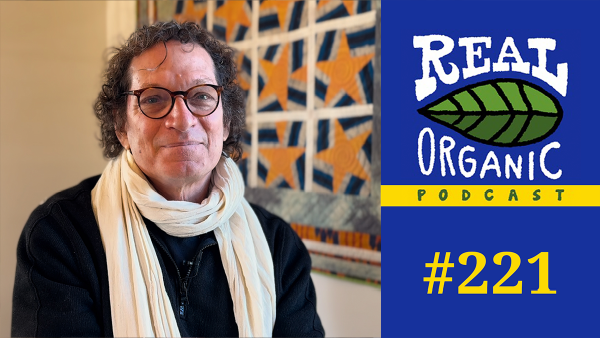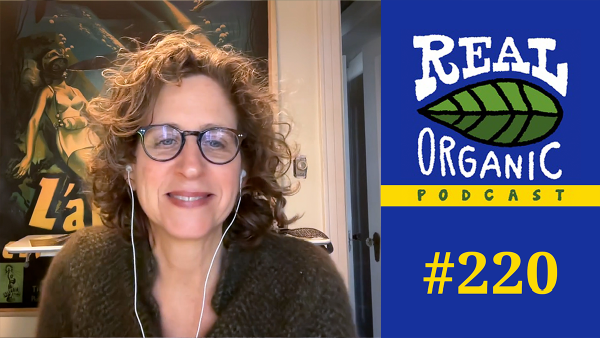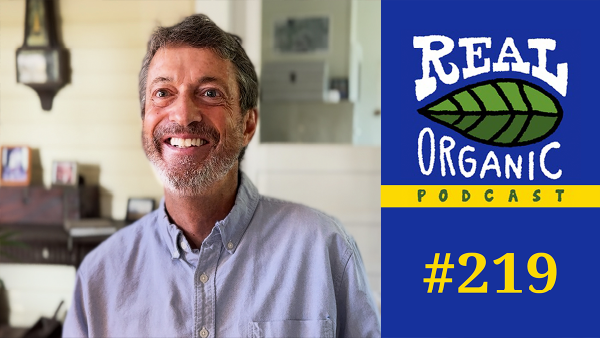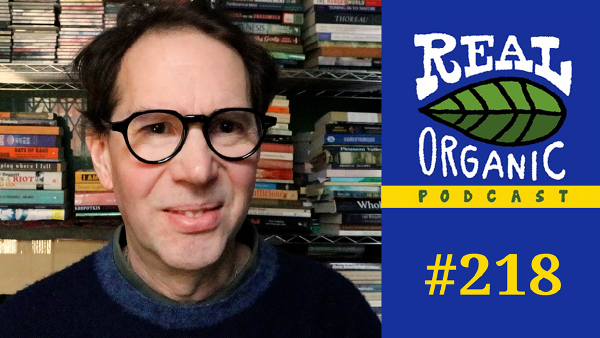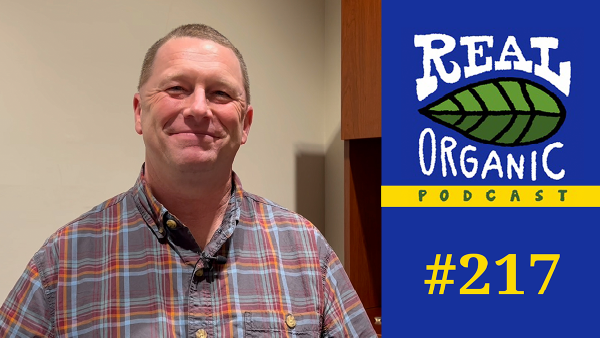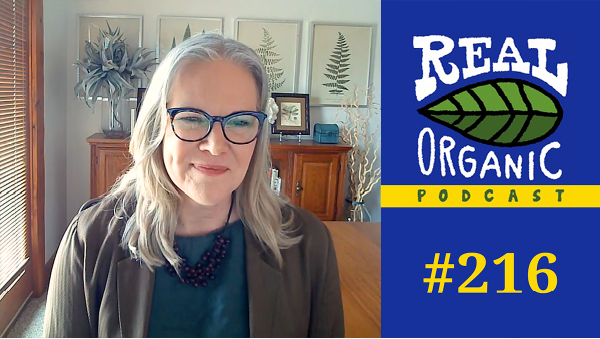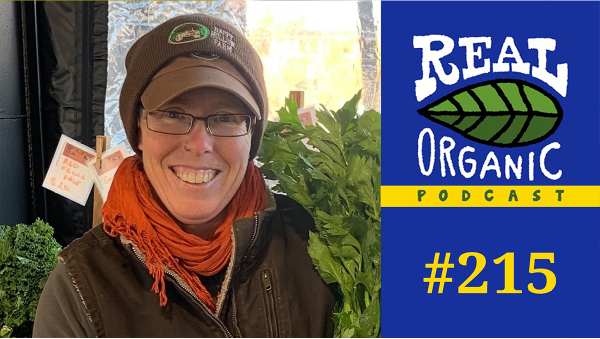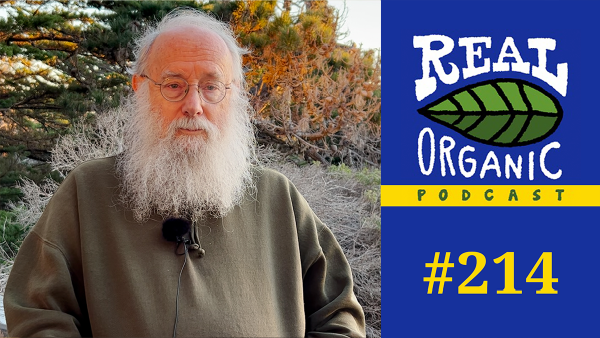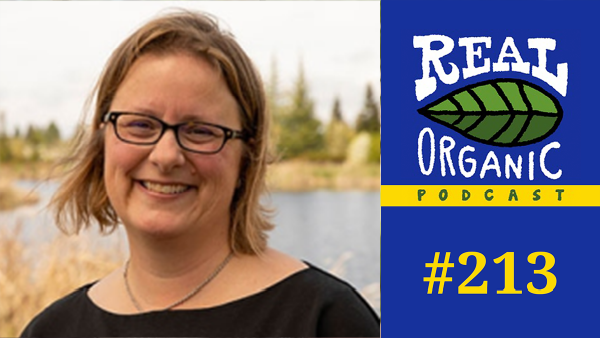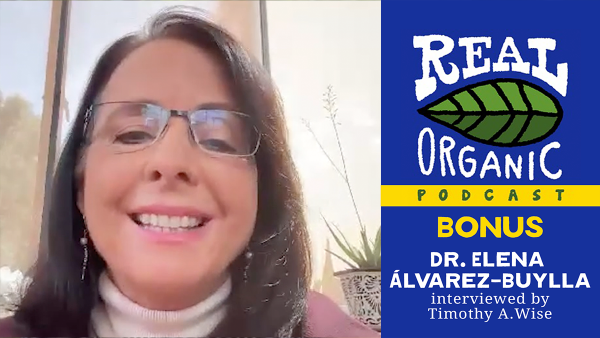Episode #202
Tim Wise at Churchtown: The Battle For Food System Resilience
Tim Wise exposes how Bill Gates and the Alliance for Green Revolution in Africa have undermined food system resilience through misguided agricultural policies. Despite investing billions, AGRA failed to meet its promises: yields barely increased, incomes stagnated, and hunger rose by 50% in participating countries. Meanwhile, real food system resilience thrives in African-led alternatives: Zambia’s largest organic training institute, Malawi’s vitamin A-rich orange maize program, and Roland Bunch’s cover cropping project that has tripled yields for 5 million farmers without expensive inputs. The problem? “Agribusiness can’t make money off them. It’s just really that simple,” Wise explains, highlighting how corporate interests block sustainable solutions that would strengthen true food system resilience.
Tim Wise’s talk has been edited for clarity and readability.
Tim Wise delivers his talk “The Battle For The Future Of Food to the crowd gathered at Churchtown Dairy on September 28, 2024, for Real Organic: A World Movement:
Linley Dixon 0:00
Our next speaker is Tim Wise. And if anybody can overcome in the language and how we describe the myths of the Green Revolution, Tim is your man, so come on up.
Tim Wise 0:21
Thanks, Linley, thank you so much to all. It’s such a such a wonderful opportunity to get to meet you all. I wish I could meet everyone, but I’ll do my best in the day we have here. Before I dive into my presentation, I wanted to actually follow up with a short story based on what Ben was talking about, about just the resilience of culture in Mexico, which includes food culture. The there was a 10 year fight, a legal fight, which they won to prevent Monsanto and other companies from being allowed to cultivate GM corn in Mexico, an amazing victory fought through the courts. The courts ended up declaring the right to maize, corn, biodiversity, a right to nature guaranteed in the Constitution as part of the right to happiness, beautiful, the one of the people who was part of those lawsuits which had to fight, I think the total ended up being something like 87 different appeals from these seed companies. So they were going to court all the time. And she’s told me that every time they went to court, they would bring a plate of supermarket bought tortillas and a plate of homemade tortillas made from native Mexican corn, and they placed them in front of the judge and greet them with these two plates and tell him you can taste the difference. And that was their introduction to how another their lawyer actually told me, I said, Why do you think you can beat the big seed companies? And he said, the judge eats tacos. He said, everybody in Mexico eats tacos. They know the difference, and so far, they’ve known the difference, which is a great thing. What I want to talk about here, though, is is mostly another part of the world, Africa. You know my book eating tomorrow. The subtitle is agribusiness, family farmers, and the battle for the future of food. And this is the battle for the future of food, if it’s going on anywhere, most intensely it’s in Africa, because they still have a native food culture to defend. It hasn’t been industrialized to the same extent, and so there’s a real, solid basis, like in parts of Mexico. Now, you may have noticed that Bill Gates is making the rounds again. Have you see, I know he has a self, basically a self funded documentary on Netflix, a set of, I think it’s nine hours. Is that right? Five hours? I don’t know too much. Bill Gates, without any acknowledgement that that people he has funded have basically made it. He’s at the UN General Assembly in New York, acting like an elected leader, which he’s gotten everyone to do because he’s a billionaire, and he’s put out and is promoting another edition of his annual goalkeeper report. The goalkeeper report is his, again, self anointed effort to track progress toward the sustainable development goals the UN sets on hunger, on poverty, on sustainability. The other night, I caught him, or he caught me, I guess, on the Stephen Colbert show, answering, basically puffball questions, which I’m sure his staff made Colbert agree to beforehand, because that’s the way the Gates Foundation works. Not going off script here, but Colbert kind of tweaked a little bit, but the goalkeeper report was really what he was trying to promote, and the focus of the goalkeeper report this year is on declining progress against child malnutrition. The progress has slowed, and Colbert asked gates what he thinks we should do about that. Because, of course, Bill has all the answers. He’s the smartest guy in the room. And so what are the solutions? And I’m not kidding, the solution turns out to be chicken bullion. Chicken bullion for the poor in Africa, he says they can’t even afford chicken so what they rely on in there to supplement their their food preparations is bullion. So what we need to do to address. Child malnutrition is fortify that bullion with 15 different vitamins. That’s all we need to do. Vitamin enhanced chicken bullion. I mean, you think about that. This guy’s up there talking about child malnutrition and and he’s offering a solution that basically has nothing to do with food. It has nothing to do with growing more food, with growing better food, with improving diets. It has to do with let’s be real, another tech upgrade, a tech upgrade of sticking more vitamins into chicken bouillon. That’s his world, but, but this is worse than ironic, and it had me kind of bolting out of my chair and completely changing my talk here because, because Bill Gates himself is actually significantly responsible for the lack of nutritional variety and diversity in Africa. He has funded, through his pet project, the Alliance for Green Revolution in Africa, with more than a billion dollars of his own money, a project that has forced and bribed African farmers to grow more and more starchy staples like corn and less and less of their traditional crops. So that’s what I want to talk about. Basically, that project, which started in 2006 has dumped, like I said, billions, if you had the subsidies that that governments provide to their farmers, they don’t provide subsidies to grow more food, they provide subsidies to grow more corn. And what do you do when you throw subsidies at a crop? People start growing more of it. We’ve seen that here. We see that anywhere. So what the result of this, this, this huge project, has been the diversion of land away from traditional staples, far healthier staples. We’re talking about millet, sorghum, sweet potatoes, cassava, parts of the traditional diet. People started pulling their land out of those crops and putting it into corn. People started not being able to grow those crops, because there was pressure on their land from other farmers. So Bill Gates is actually quite directly responsible for the decline in crop diversity in Africa, and that results in a decline in diet diversity. Because what are these poor smaller farmers eat? They eat what they grow? If all you’re growing is corn. You’re only eating corn, and they’ve seen diet diversity go way, way down in big parts of Africa. And that would be, that would be almost arguably tolerable if you were growing a whole lot more corn, and that’s the theory, right? We’re going to, we’re going to subsidize it, we’re going to get you new commercial varieties that’ll be high yielding, and we’re going to, we’re going to subsidize your fertilizer. And with all of that, you’re going to get this big jump in harvests. You’re going to sell it, and with that money, you’re going to buy diverse diets. Guess what? No yield increases to speak of, no income improvements to speak of, and worsening hunger. I did a separate study after my book was published that is kind of remarkably stayed like the what the numbers to that people have to answer to and it was done four years ago, but they have no answers to this. Agra came in promising a doubling of yields for 30 million farmers, a doubling of incomes for 30 million farmers, and cutting food insecurity in half. So ambitious goals, I give them credit for ambitious goals. They achieved none of them and didn’t even come close. The yields, even on corn, went up in what 12 years, 20, 27% it’s a very slow yield growth for your priority crop. Of course. What happened with the yields for all the other traditional staples? They went down, cassava, millet land, planted to those went down and yields went down overall. I created a something I called a staple yield index that sort of combined all of these different traditional main crops into one package. It showed a whopping yield increase over 12 years of 18% that is slower than it was before this grand Green Revolution project came on the scene. So a complete disaster on yields, incomes. Well, if you’re not really getting much of a surplus, you’re not really selling much more. And guess what? All of those inputs cost more money than what you were doing before. You were saving yourself. Seeds you were replanting. You had very low costs, pretty low yields, but now you have very high costs, not much higher yields. Many of those farmers ended up in debt and lost their land. So incomes, not, not, not a success story for Agra and reduced hunger.
Tim Wise 10:22
We’re focusing on child malnutrition in the in his goalkeeper report, and slowing progress. Well. Thank you, Bill, you are partial, partly responsible. 13 African countries are part of this alliance for a Green Revolution in Africa. Participate in it. In those countries, hunger didn’t go down by 50% it went up by 50% literally, a 50% increase in the number of severely, chronically hungry people, a disaster. So Bill, Bill Gates, the goalkeeper isn’t exactly keeping track of his own goals. These were his goals coming in with the Alliance for Green Revolution in Africa, and he failed miserably on everyone. African farm groups have been pressuring every year, bringing these results to look to the attention of African governments. Development Agency USAID supports this program, you’ll be sad to know, but not surprised. And and people like the Gates Foundation and they’ve just doubled down year after year on further further tweaks to their green revolution paradigm that involve, you know, guess what? The problem with the soils, soils are now have now been been acidified with all the all the monocultures of corn fed by synthetic fertilizer, and so soil fertility has gone down. So what’s the solution to that? Is it to stop growing monocultures? No, it’s to make them buy lime and get lumped with lime all over their land so that they can restore the address the acidity of the soil, sure that land needs lime. No, farmers are not going to go out and buy yet another input they can’t afford to address the soil fertility that your programs have caused. That is the paradigm that we’re looking at of the Green Revolution and all of this, with all this, again, child malnutrition, and Bill’s answer is, let them eat bullion. I mean, think about that in Zambia, which is a country that I focus on in in my in my book, that is arguably one of the Green Revolution success stories. If success is measured by the use of inputs, it uses one of the highest amounts of fertilizer in Sub Saharan Africa, outside of South Africa, it uses a fairly high rate of commercial hybrid seeds, corn seeds for its corn, and it is now suffering what one one recent report called a collapse of its food system. Again, a very underreported story of 50% of the drought has hit the region really hard for in multiple years, but this year particularly hard, and farmers have found that their their farms and families are just way less resilient to that drought, to that climate shock. And again, that’s not surprising. Half the corn crop has failed. Soils are acidic, less fertile from all the monocultures and fertilizer and the farmers don’t have, you know, they were all planted up in corn. They’re not growing cassava anymore. They’re not growing millet. They’re not growing drought tolerant crops that that could have survived the drought. They could have given them something to eat out of their fields, gates and USAID African Development Bank and African governments have made no movement away from this model of agriculture. The only movement away has been that Agra, the Alliance for Green Revolution in Africa took Green Revolution out of its name. I’m not kidding. We were shocked like, okay, I guess that’s a victory. Is the Green Revolution now? So embarrassing, so such a such it’s suddenly baggage. I mean, who thought that the Green Revolution could ever become baggage to to these huge development agencies? It’s baggage. So they now say they don’t know explanation for why, and they say we’re now, heretofore, only to be known as Agra, the acronym i. To which I replied, So Agra literally stands for nothing now.
Tim Wise 15:13
And they didn’t like that. And and they, you know, you take the Green Revolution out of the name. They haven’t taken the Green Revolution out of any of their policies or priorities. They have, however, lost a lot of funding, which is a good thing, partly because, I think of the of the attention we’ve brought to the failures of the of the model. A lot of people here have talking about, talked about that, that the one of the things we have on our side, which is a really sad thing to have on your side, is that the current system is failing and collapsing. And to the extent we can get people to pay attention to that, there’s a motivation to do something different. And I do think we we see that, but, but this question of alternatives, and I want to, I want, I want to focus on the alternatives, because what I say in my book is that the tragedy of all of this, this doubling down on policies like the Green Revolution, is that, is that African governments only need to look out at their own small scale farmers and farmer organizations to see better, that There are better alternatives. They’re everywhere. I saw them everywhere where I went to research my book in in Zambia, suffering food system collapse, this remarkable organization called the cassisi Agricultural Technology Training Association started out in the 90s as a Green Revolution promotion agency and training people up in Green Revolution technologies. Guess what? They noticed that their cohorts of farmers that it wasn’t working, that they were seeing short bursts of a yield increase, flattening yields, the need for more fertilizer every year to keep the yields going, loss of crop diversity, all the things we know go wrong, they noticed, and they said, We’re going to change course. Their director went and did a bunch of training to a bunch of training programs. Came back, and cassisi is now the largest organic Training Institute in the country. And you can bet their farmers, intercropped with a whole variety of different food crops, aren’t suffering the same as these other farmers in this drought. They’re finding a way to be resilient and to and to feed their families. But I saw programs like this everywhere in central Malawi, it was this beautiful project that, I mean Malawi is all corn all the time, basically. I mean even the powers that be acknowledged that they’re they’re too focused on corn. But the so a university program in central Malawi partnered with a with a farmer organization, because as nutritionists, they wanted to see about increasing nutritional diversity, diet diversity, by increasing crop diversity, was that a real thing? They went into these communities, they identified a remarkable bright orange variety of maize that was being corn that was being grown in one of the communities. They tested it, it was incredibly high in vitamin A, which is a deficiency that’s really common in developing countries, but particularly in Malawi. And they said, people like this corn. It grows well in these environments. It doesn’t need fertilizer. It grows well intercropped with other with other crops. Let’s propagate this and use it as an agro ecology training exercise where we we reintroduce intercropping of of multiple crops, use of small livestock in their manure, for for for compost, and in the process, also reintroduce food products that take advantage of that crop diversity. Massive improvements all down the line on every measure you could ever want? Bill Gates says he wants to increase yields. They were getting way higher yields than anything Gates has seen for corn, and they’re getting other things out of their land too. Climate Resilience. The corn crop has a hard year because of drought. The pigeon peas survive. The cassava survives. There are other things to eat coming out of coming out of that land, and the soil gets better and better. Surprise, the soil gets better and better. You’re not mining it, you’re feeding it and and those are, you know, these are university researchers working the measurable differences in. Uh, carbon in the soil and and organic matter and fertility and the resulting yield improvements. There’s a large, larger project that some of you, I’m never I’m always surprised that nobody knows about Roland bunch. Some you, some of you must know about Roland bunch. Nobody knows, hardly anybody. It’s kind of remarkable, right? I mean, he has this crazy he’s from the US originally. He’s he’s been out in the world doing all kinds of things for a long time, Central America and Africa. He has this great project that he’s been doing, kind of as an NGO, but with some support from starting to get some support from development agencies, from like Catholic Relief Services, from governments that he calls green manure cover cropping in Africa that looks a whole lot different than you’d think it would look here, because what it basically is, is agroforestry and intercropping. So he’s taking these maize monocultures that have been that people have been trained to do and pushed to do and subsidized to do, and he’s saying, All you guys have to do is intercrop that maize with a leguminous crop that we will tell we will help you define what is going to be the most useful to you And the most adapted to your soils. That’s their one real technical piece of expertise. I think they help with planting density of the corn too, and whether there are any any agri for any trees that would be beneficial to be growing on these farms. And with that project, he has seen, in a course of five years, tripling of maize yields with no additional inputs. The only input is their first provision of that seed for the intercrop and for the tree after that, it’s self provisioning. There are no inputs to buy, there are no costs, and they’ve seen massive improvements in yields and all the measures that come with that, food security and incomes. It’s now operating. And last I saw, I think, he sent out a progress report in November on five with 5 million farmers in Africa. So this is not a little pilot project. And he says it. He said this was a little pilot project. Now it’s a giant pilot project. And where are the governments coming in and saying, we’re not going to use your millions of dollars for Green Revolution crap anymore. We’re going to use it for this. The reason those policy changes don’t take hold. And this is kind of the main message of my book. That was my question going out into like, if these low cost solutions are right at hand, why aren’t people doing them? You know, it’s because agribusiness can’t make money off them. It’s just really that simple, and agribusiness drives the bus, and agribusiness writes the policies. And when I say they write the policies, they actually write the policies. I was in Malawi and was reporting on their new seed policy, which was awful. And I said to an NGO leader there, I said, I said this policy is so bad it could have been written by Monsanto. And he looks down at his shoes and he says, well, one of the authors was from Monsanto. I’m like, nobody in Malawi knew that at the time. It became big news and created a lot of pushback on that terrible seed bill. But that seed bill would have outlawed those great farmers using that bright orange vitamin A maze corn in central Malawi. Would have prevented them from selling their seeds to other communities to allow them to do the project. It would have outlawed seeds. These These policies are so draconian that they tell these farmers that they’re unless their seeds are certified, they can’t call them seeds. They can only call them grain. No kidding. You know, I had one of those farmers hold up one of his bright orange kernels of corn and say, we’ve been growing this for generations, and you’re going to tell me that, I can’t call it a seed, but it’s that cynical, and that’s again, the world that Bill Gates hath wrought for this kind of perspective on farming. The good news is, African farm and faith leaders have completely had enough. Faith leaders last month actually sent a letter to the Gates Foundation calling for reparations for damages from the Green Revolution,
Tim Wise 24:54
if they follow through, then in the next couple of weeks, they’re going to send a letter with. That letter to Melinda French gates saying, Oh, well, now that you’re so focused, you’re independent and so focused on women and girls, let us tell you about the reparations needed for the damage to women and girls from the Green Revolution in Africa. I mean, as I told you, I do think the tide is turning in some ways, that after that, Agra has lost much of its funding. The gates really a wholly owned subsidiary of the Gates Foundation. At this point, I think they’re providing 90% of its funds, but it keeps pushing these policies, but with all these alternatives, and with very well organized groups like the Alliance for food sovereignty in Africa, which is the largest civil society organization on the continent, with member groups all over explicitly campaigning for agroecology, for they have a great, great campaign, how My food is African, for local foods. Let’s stop buying chicken bouillon from Bill Gates and start growing our own foods. One of the things they’re going to fight that I heard is in is the new one in the cards is Bill Gates is now really interested in animals. Guess what that means? It means trying to appropriate the G the genome of the of the village chickens that are so much more popular in Africa than the store bought chickens, the traditional ones that we we consume off of factory farms so that they can appropriate that that product for themselves. But but the pushback is stronger and stronger in Africa right now, and I think they’re really getting some traction on the demands for agroecology, but, and that really is my, my, my conclusion is that, you know, it’s very much like the Real Organic Project here, there, there are organizations working tirelessly, farmers working tirelessly to show the alternative. There is a better way that we have a better way, and if we also fight for policies that stop favoring agribusiness and chemical agriculture and start favoring agroecology, organic agriculture, we can see a real a real difference. Thank you. Applause.


